People use CPAP for different reasons, one of them being sleep apnea. Most of the CPAP (Continuous positive airway pressure) devices on the market are AC-powered. So when there is no electricity or when you are traveling somewhere, it could be difficult. To mitigate such a situation, we can use portable battery backups. In this article, we shall see some of the best battery backups for CPAP devices. You’ll learn more about what to look at while purchasing a CPAP battery and our best picks, which will help you make an informed purchase.
There are many reasons for wanting to use CPAP battery backup – one of the common ones being unreliable sources of electricity to run your CPAP machine. Other times it’s a busy travel schedule that takes you to off-grid places where sources of power are limited and inconsistent.
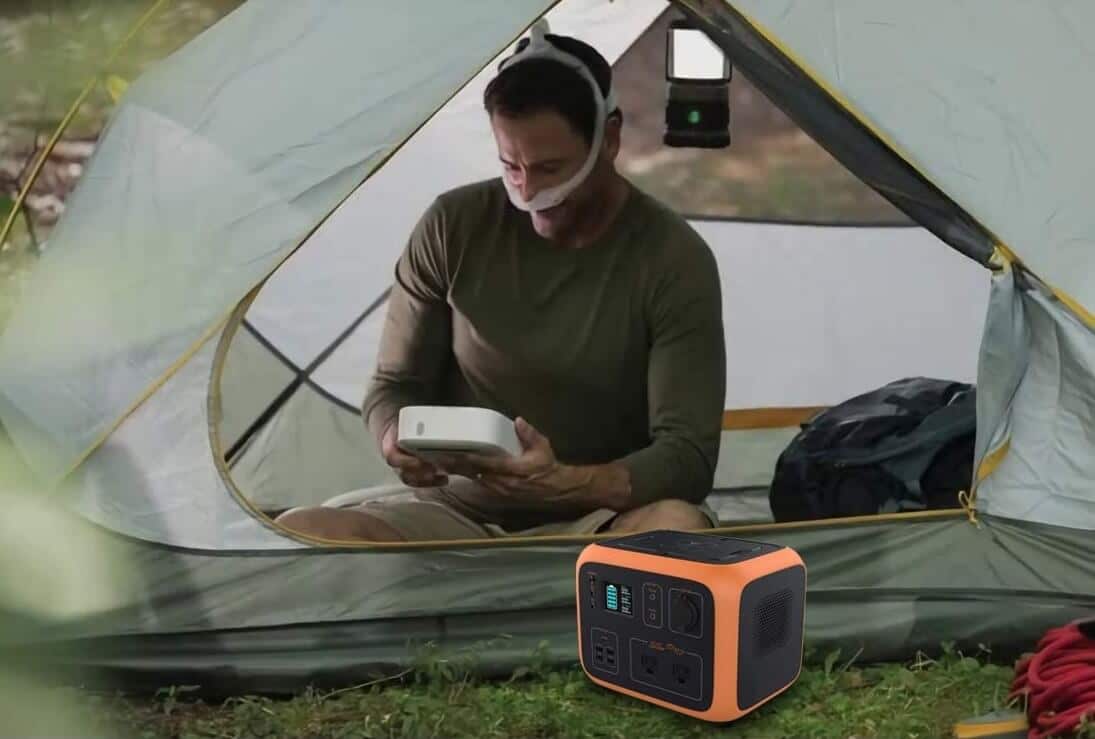
In other scenarios, people are remotely located, and lousy weather quickly brings down the power grid. Whichever the case might be, a CPAP battery pack can offer significant assistance in such inconvenient times.
Before looking at our seven best picks, the following information should help you get started.
Things to consider when buying a portable battery for CPAP
1. Battery Capacity
This has to be the number one consideration in choosing a battery for your CPAP machine. The battery life determines how long your CPAP device can be powered with the battery. For example, if your CPAP requires 50W of power and you have a 500Wh battery. In this case, your battery can drive your CPAP continuously for 10 hours. Similarly, if the battery rating is just 200Wh, the backup time will be 4 hours.
Off-grid locations require you to have machines that can sustain overnight functions, or at the very least, one that can last long on a single charge. Therefore, to secure yourself from significant disappointments and inconveniences, you must pay attention to battery life.
Typically, CPAP devices like Resmed consumes around 50W of power/hr but it is signifcantly lower if used without humidification
2. Power Capacity
As the battery capacity, the power output capacity of a CPAP battery is another significant consideration. The power capacity determines whether your battery can power your CPAP or not. For example, if your battery’s power capacity is 50W and your CPAP requires 55W, then the battery cannot power your CPAP.
Most backup CPAP batteries have a power rating below 100W. This means that the best option you have is buying one closer to or above the 100W power rating. With so doing, you’ll have an added advantage of extending the use-time with your CPAP machine. If you are planning to use this battery for powering gadgets like TV, Laptop, etc along with your CPAP, you should pick a multi-purpose portable power station.
3. Portability
The last but certainly not least consideration you should observe is the battery’s portability. Travelling already comes with so much lifting, and to add to your luggage might make you more frustrated.
Therefore, you need a portable CPAP battery to minimize the heavy lifting in your travel. More and more people are inclined to own less bulky and sleeker CPAP machines. This goes without saying that they also prefer CPAP batteries capable of matching the same design.
However, in looking at portability, you must ensure that you pay close attention to the battery’s functionality.
Now that you have some significant knowledge of what to consider before buying a portable battery for your CPAP machine let’s look at the products.
Comparison of CPAP Power Stations
| Rockpals (Best Budget) |
Bluetti (Best Features) |
Ecoflow River (Highest Power) | Jackery | Aeiusny | Baldr330 (Cheap -est) |
Renogy |
|
| Power Capacity (W) | 300 | 300 | 600 | 200 | 500 | 330 | 200 |
| Battery Capacity (Wh) | 288 | 500 | 288 | 240 | 288 | 297 | 337 |
| Price/Wh (approx) |
$0.81 | $0.71 | $1.11 | $1.04 | $0.94 | $0.88 | $1.06 |
| CPAP Backup Time (Approx) | 3.5 Nights | 6 Nights | 3.5 Nights | 3 Nights | 3.5 Nights | 4 Nights | 4 Nights |
| Solar Panel Support | 100W | 120W | 200W | 100W | 60W | 100W | 100W |
| Weight | 7.7 lbs | 13.6 lbs | 11 lbs | 6.6 lbs | 7 lbs | 7.1 lbs | 6.4 lbs |
*Numbers may be approximate. CPAP backup time is based on Resmed Airsense 10
**Green represents best in the category
Note: If you do the math, the power consumption appears to be 50W/hr / 500Wh battery = 10 hours backup. This is true when you use the AC adapter and humidification (with pressure/temp control). Instead, if you directly plug the CPAP device into the DC port of the battery bank and turn off the humidifier, the backup time triples (sometimes quadruples).
Our Best CPAP Battery Picks
While choosing the power stations, I made sure all of them are suitable with almost 95% of CPAP devices including Resmed, Philips, DeVilbiss, etc. Also, I have picked batteries of different capacities ranging from 200Wh to as high as 500Wh. This is to make sure that the backup time will be at least a day.
Also, choosing a power generator of higher wattage (say 300W) will let you use the battery for powering many other electronic equipment. For example, if you own a 300W battery station, it can not only power your CPCP but also your laptop, TV, electric bulbs, etc.
1. Rockpals 300W Power Station (300W/288Wh)
Rockpals 300W Power Station comes equipped with a 288 watt-hour rechargeable lithium battery. Its design allows it to offer enough power to both running small devices and heavy-duty electronic items. Yes, apart from turning on your CPAP machine, this portable battery can also power a mini-refrigerator, an LCD television, fans, and a laptop, among other appliances.
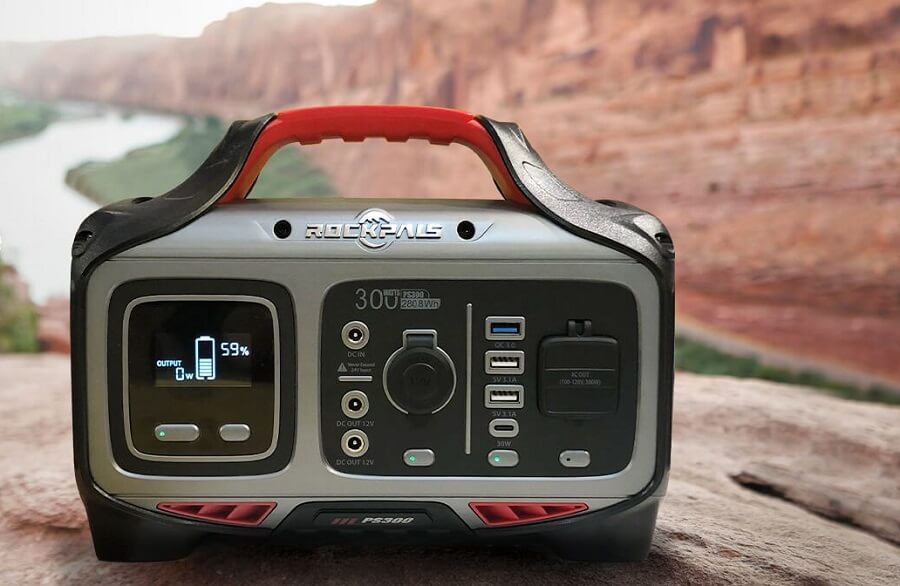
It has ten different ports that allow you freedom of connectivity with as many devices as possible. They include:
• Two 12V/5A DC ports
• 12V/10A Cigarette Lighter port
• One 3.0 USB and one USB C PD ports
• Two USB 3.1 Ports
• One 110V AC
Each port section of ports has dedicated buttons to turn them on, and LCDs to indicate current selection and other stats like power usage.
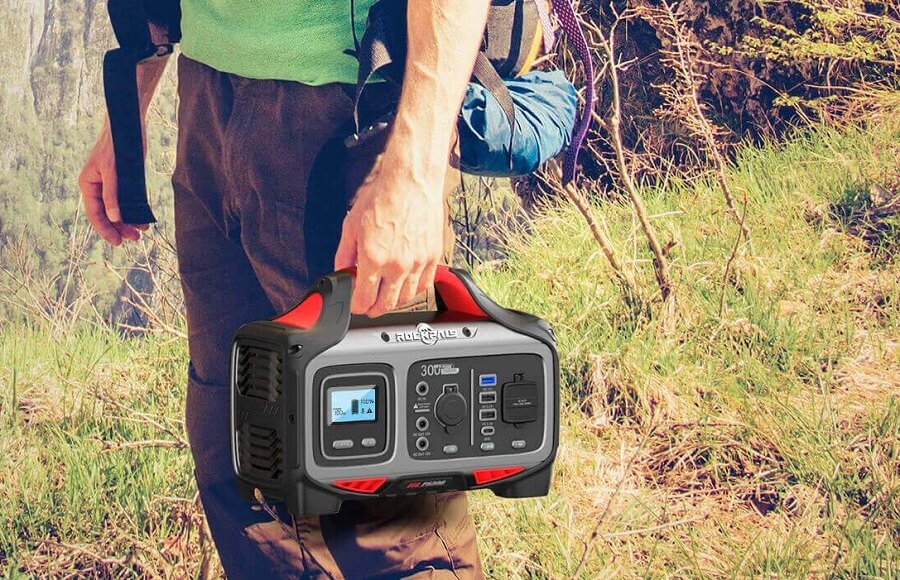
The Rokpals 300 power station has a compact size and only weighs 7.7lbs, which is around 3.3 kilograms. This makes it one of the most portable CPAP batteries on the market. This 300W battery station supports solar charging and the MC4 cables are included in the package.
P.S: Check here (their newer 500W model if you need it).
Features I Liked
- Compact & portable design
- Different ports for powering various devices at once
- Compatible with any CPAP machine
- Huge 300W power capacity
2. Bluetti AC50 Battery Station (300W/500Wh)
Second on the list is Bluetti AC50 500Wh portable power station that keeps your gear running, both indoors and out. The AC50 is a small, lighter design CPAP battery pack capable of sustaining you for long hours if not for days.
The battery is a 500Wh Lithium-Ion battery capable of almost 100% capacity draw. This means that you can use nearly 100% of this power station’s battery. Therefore, it gives you the privilege of exhausting its full potential. Like Rockpals, Bluetti AC50 also supports solar charging. You can buy a good portable solar panel to get your job done.
As for the ports, they are distributed in the following manner:
• 120V AC
• Four USB 3A ports
• One USB Type C rated 45W
• Two 5.5 x 2.1mm barrel ports
• Solar input rated at 14V-40V
Moreover, this power station comes with a wireless charging pad located on its top. The AC50 is quite a portable power station that only weighs 13lbs and can easily be carried around.
To help sleep apnea patients sleep peacefully, this battery has a silent operation and the LCD background light automatically turns off after 10 minutes.
Features I Liked
- Super huge 500Wh battery capacity
- Built-in LED light
- MPPT Solar charging pre-installed
- Wireless charging for Smartphones
P.S: You can use the coupon code “BLUETTI50” to get an additional 4% discount.
3. Ecoflow River Portable Battery (600W/288Wh)
Ecoflow River is one of the most affordable portable power units you can ever buy. I have been using it for over 6 months now and I love it. It has got a power rating of 600W which can not only power CPAP machines like Resmed but also your laptop, TV and many other gadgets. You also have a surge rating of 1200W which is the highest on this list.
Note: Ecoflow R600 is now sold as Ecoflow River
With a battery capacity of 288Wh, this unit is very small and portable. Thus, if you are looking for an ultra-portable CPAP battery for camping, R600 is for you.
Costing just around $300, this CPAP battery backup is budget friendly and multipurpose
Unlike many traditional power stations, R600 supports fast charging. It can recharge from 0 to 80% in 1 hour. You can charge it with a regular AC port, solar panel and car port. Also, R600 is a smart device and can be controlled with your smartphone.
You have the following output ports on the device,
• 3x AC Outlet Ports
• 3x USB A Ports (one of them supports fast charging)
• 100W USB C Port
• 12V DC Output
• 12V Car Outlet
Features I Liked
- 600W Power capacity which is amazing
- 288Wh battery capacity (can power any CPAP device)
- Ultra-portable
- Smart device
4. Jackery Explorer 240 Portable Battery Backup (200W, 240Wh)
Coming from Jackery, the explorer 240 is among the lightest mobile power stations in the market. With a 200W power rating, this backup battery can power almost every CPAP device in the market. Like many other power stations on this list, Explorer 240 supports solar charging.
Additionally, the power capacity of this Jackery invention is 240Wh/67,000mAh. This gives you a long run of whatever activity takes you to the off-grid spaces.
It has many output ports from which several devices can draw power simultaneously. Due to its limited power output, you can’t power devices like blenders, rice cookers but a CPAP device can easily run for around 35 hours.
• DC Car Port (cable included)
• 2 USB Type-A ports
• AC Output
• Power input port
This is a very lightweight and portable battery pack that only weighs 13.32lbs. Because of its many connectivity options, the Jackery Explorer is compatible most, if not all, your electrical appliances.
Features I Liked
- Lightweight (only 6.6 lbs)
- 400W Peak Surge Power
- Aesthetic Design
5. Aeiusny Portable Solar Generator for CPAP (500W/288Wh)
Fifth on the list is Aeiusny battery backup. It’s a pretty reliable and durable power station with robust build to it. Moreover, this is an eco-friendly and large capacity portable power station capable of simultaneously charging nine devices. It’s a gas-free, noise-free, and fume-free portable charger, which makes it one of the best CPAP batteries for camping.
With a power rating of 296Wh (10.8V/25.5Ah)/400W, this power station offers premium portable energy solutions in off-grid spaces. Other than that, the Aeiusny portable solar generator features multiple ports for better charging options.
The ports include:
• 3 AC outlets
• 4 DC ports
• 4 USB ports
• AC and Solar Input ports
Apart from being such helpful, it’s also portable and offers you hassle-free traveling benefits. At just 7lbs, you can easily carry the battery in any of your outdoor adventures. Like many battery backup options for CPAP, this, too, is compatible with different home appliances like TV, laptop, etc.
Features I Liked
- Decent battery capacity
- 1000W Peak Surge Power
- Lightweight and portable (weighs only 7lbs)
6. BALDR Portable CPAP Power Backup (200W/337Wh)
Baldr330 is probably the highest-rated CPAP battery on Amazon and it deserves it. With this battery, you get 330W of power which is good enough to power any CPAP equipment. With a lithium battery capacity of about 288Wh, Baldr can keep your CPAP device running for several days.
You get different ports on the front, a wireless phone charger and an SOS light on the top surface. This battery generator can also be charged via a solar panel. So, if you are taking it on a road trip, consider getting a portable solar panel.
Weighing just around 7 pounds, this battery is definitely lightweight. If there is one thing that I don’t like about this station, it would be the design. Baldr lacks aesthetics but who cares when you’ve got every other thing right.
The ports include:
• 1 AC outlet
• 3 DC ports
• 3 USB ports
• 1 USB C port
Features I Liked
- Decent battery capacity
- Wireless phone charger
- Lots of ports
- Very portable
7. Renogy Phoenix 300 CPAP Battery (200W/337Wh)
With 337Wh battery capacity, the Phoenix 300 power station is super lightweight. Weighing in about 6.5lbs, you can carry it anywhere. Its compact design doesn’t sacrifice the density of the battery cells. With solar charging capability, this battery generator for CPAP can be useful for outdoor camping, picnics, and road trips..
Additionally, it’s part of the Pure-Sine wave that produces clean, stable, and noise-free AC energy of 200W. This means that your electronic devices will be safely and efficiently powered up. The Renogy Phoenix has multiple output and input ports to supplement the needed connectivity options.
They include:
• USB-C Port (60W PD)
• CIG Port
• D-Tap Port (for cameras)
• DC Port
• 3 USB Ports
• 2 AC Outlets
As pointed out earlier, this is one of the lightest portable CPAP batteries for camping. Even though it costs more when compared to others, the portability outweighs the price.
Features I Liked
• A wide selection of ports
• Super lightweight
• 337Wh battery capacity
P.S: Phoenix 300 is available on Amazon as well as their official website. If you buy it on their official site, you can get a 10% additional discount by using coupon code “RNG4G10”
Final Verdict
Now that you have seen the best battery backups for your CPAP device, it is time for my final advice. If I place myself in your shoes, I would go with either Rockpals 300 or Bluetti AC50. Rockpals is an amazing budget-friendly option. Bluetti is packed with so many good features but it is slightly expensive. If you are looking for multipurpose use (including CPAP), Ecoflow River is a good option. If I am very tight on budget, I would go with Baldr. It is a basic battery backup but it can do the job. Jackery 240 and Aeiusny are very good alternatives but are slightly expensive. Renogy is quite advanced and may not be suitable for everyone. If you need more ports, going with Renogy makes sense.

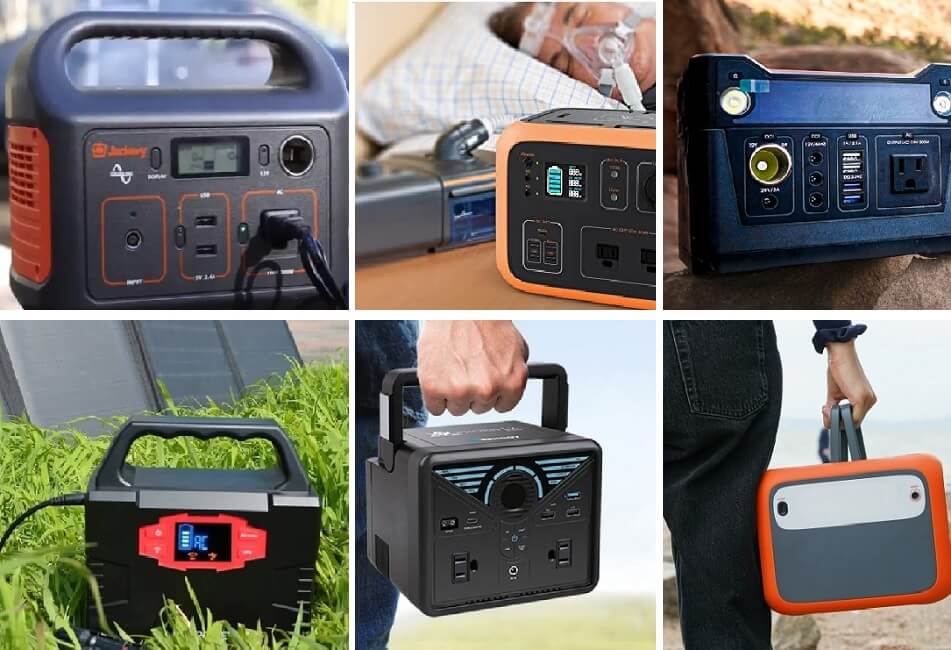
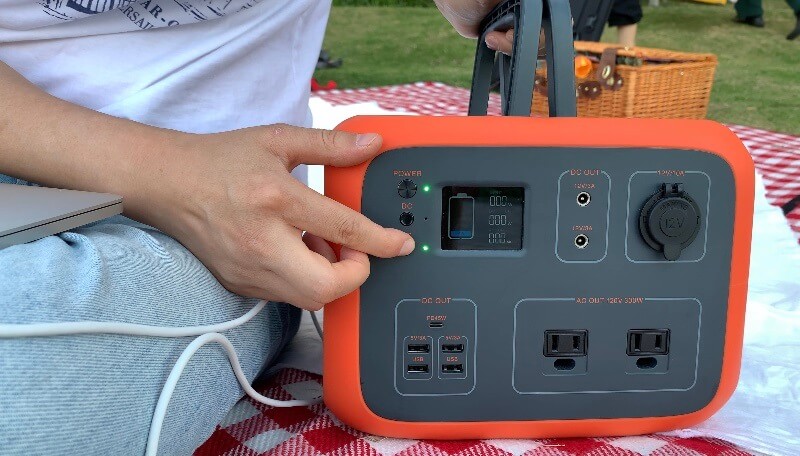

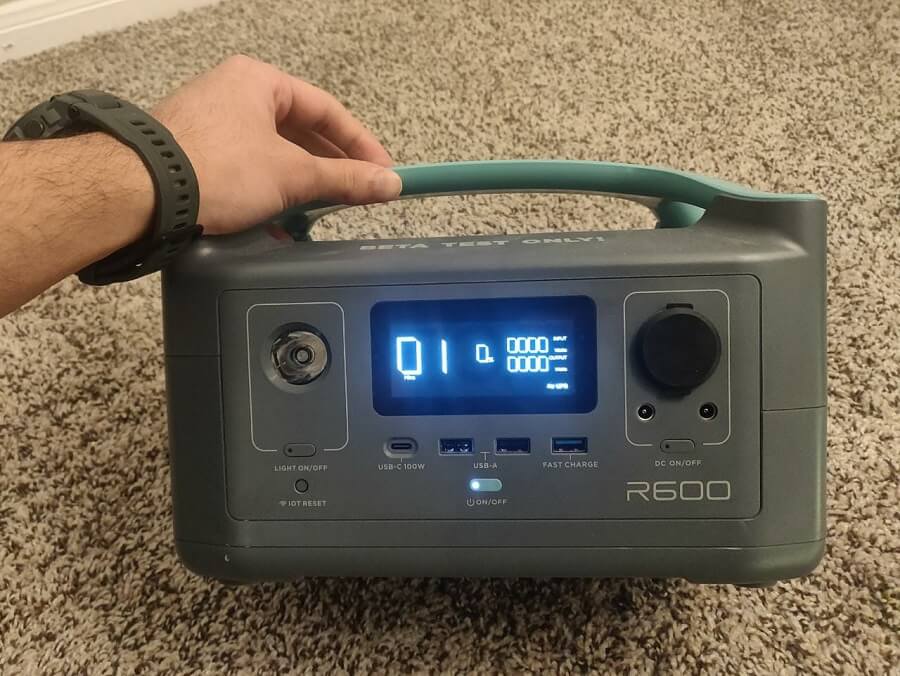
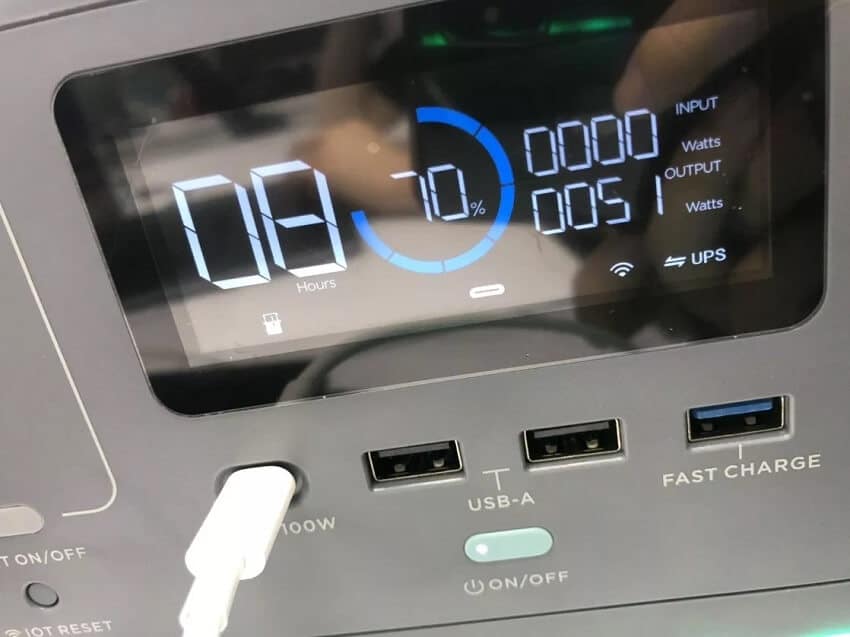
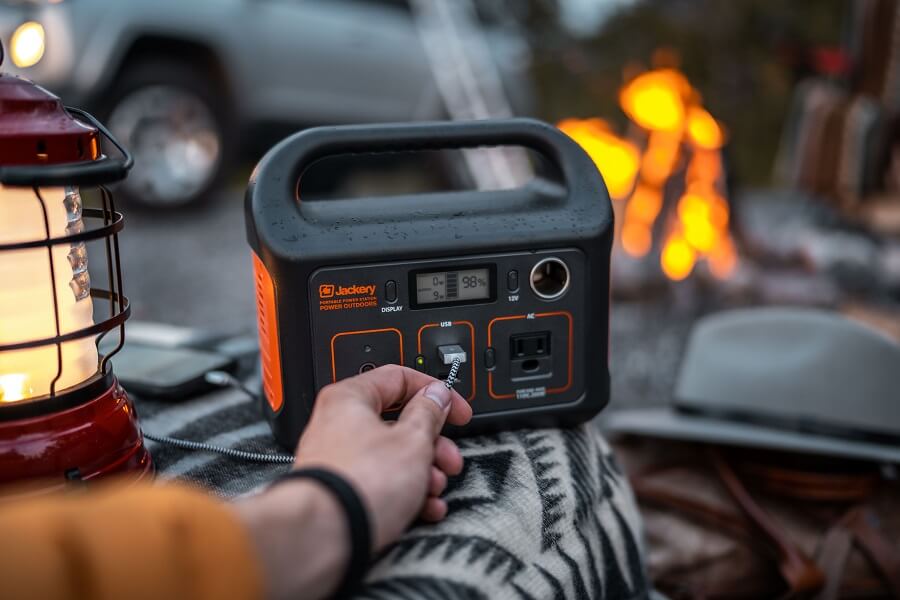
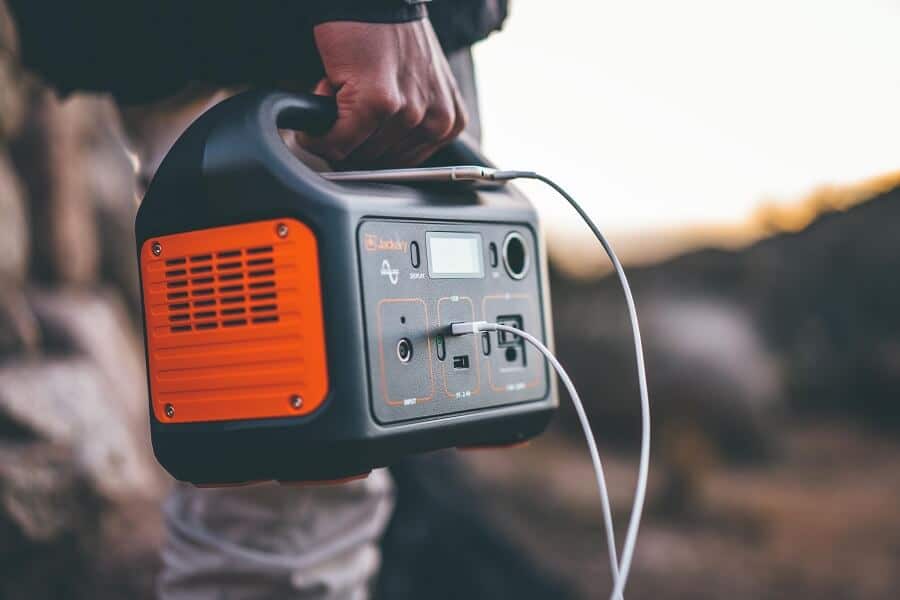
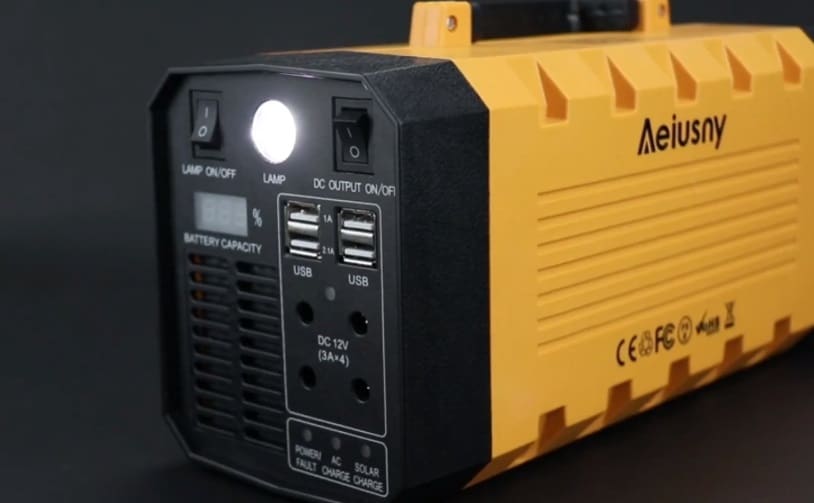
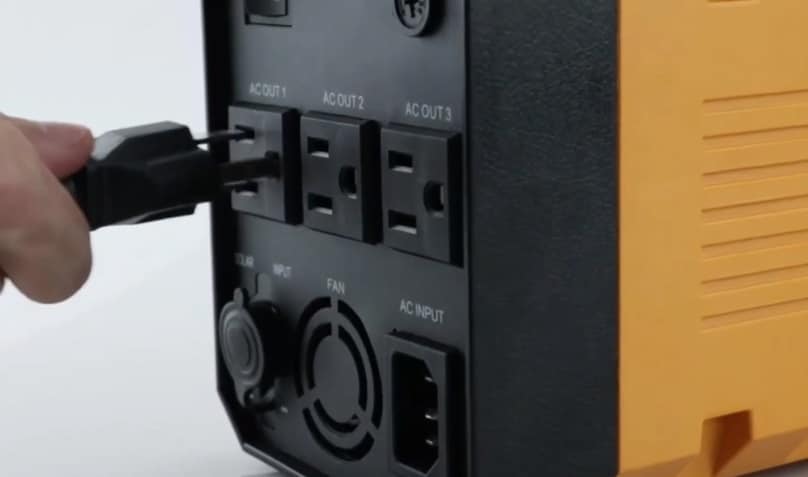


Will the AirFlow 10 operate on an 18 volt power tool battery? If so, how long on a 6Ah battery?
I’m afraid it won’t. This is the requirement listed on AirFlow 10’s user manual (https://document.resmed.com/en-us/documents/products/machine/airsense-series/user-guide/airsense-10-device-with-humidifier_user-guide_amer_eng.pdf)
AC input range: 100–240V, 50–60Hz 1.0–1.5A, Class II
DC Output – 90 W Power Supply: 24V — 3.75A
Typical Power Consumption: 53W (57VA)
Peak Power Consumption: 104W (108VA)
As you see, it requires a 24V DC power to operate. As far as I know, it cannot run on an 18V battery. Let me know if you have anymore questions
I’m looking for a unit capable of powering two CPAP machines at the same time during power outages . I have a gas generator but prefer not to run it all night for just our CPAPs. Would you recommend any of the units you’ve reviewed above or is there another unit I should consider ? Thanks
Typically, CPAP machines drAw less than 100W power. As long as you choose a battery/power station that offers over 200W power output, you can easily power two CPAPs at the same time. But keep in mind that the backup duration reduces by half. So, I recommend going with a higher battery capacity. A 300W, 500Wh battery station would be ideal. Ecoflow R600 or Bluetti AC50S looks good.
Hi Ninad,
When I looked up the power needs for the AirSense 10 on DC, shows a need of 24V at 3.75amps, concerned that most of these systems provide only 12V DC. When you tested, did you use AC or DC ? And if DC did you find the need for 24V.
I’d rather use these more general battery systems than a specific CPAP battery.
Many thanks for review.
Hi Doug,
Since a power station support both AC and DC outputs, you can use either of them. AirSense works perfectly fine on AC input, so you can just use the included power cord to hook it up to the power station’s AC port.
But it is better to get a power staion with 12-24V DC output. While most power stations only support 12V, some like Rockpals support both 12 and 24V. Worst case, you can purchase a cigarette port to 24V DC coverter on Amazon for $10 or so and get 24V from your 12V output.
No matter which battery station you buy, you always have the AC output which works with any CPAP device. Let me know if you need any more info.
I heard the FAA carry on limit for Li-ion battery is 160 watts. If true, what is your recommendation w a carry-on battery?
I think the FAA limit is up to 300 Watt-hour if you are carrying a single battery. If that is the case, I highly recommend Ecoflow R600. You can see my review here
Ninad:
Thank you for your review of CPAP batteries. So much of what I find on the internet on this subject is a simple sales promotion, not an unbiased review. I am confused however about the table you provide at the end of this article. Initially you mention that CPAP devices typically consume about 50 W power. For the Bluetti, the battery capacity is listed as 500 Wh. This means, I think, it can power a 50 W machine for 10 hours. I sleep about 8 hours per night, so this would provide about 1.25 nights of power for a CPAP. The table, however, states that the Bluetti provides about 6 nights of CPAP backup time. Please explain.
Hi David,
Thanks for your question. I had the exact same doubt when I was creating the table. So, when I contacted the manufacturer directly, they said that when you turn off the humidifier on your CPAP machine, the backup time is significantly higher. Also, since most of these power stations support direct DC, you can save a lot of power by connecting your CPAP over DC port rather than connecting it via the AC adapter. So, these two factors will result in a longer backup duration. With Bluetti, you can easily achieve at least 4 nights (as per the company’s response). Hope my answer helps you. Let me know if you have any more questions.
Ninad Maneghatta